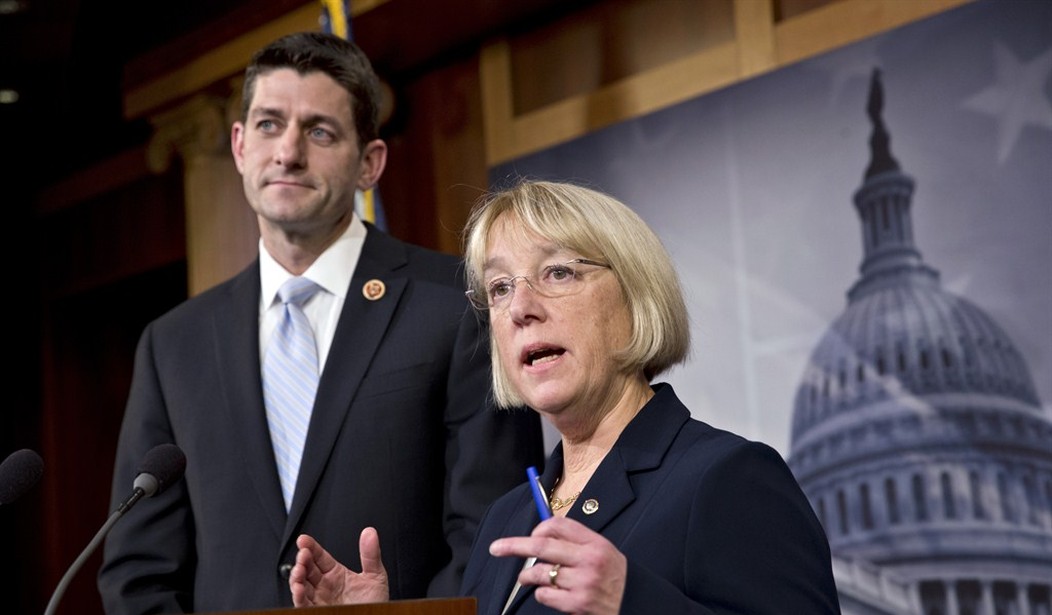The passage of the Ryan-Murray budget deal in Congress last week has been celebrated by the liberal media as a historic event, in and of itself. When one considers that the Congress hasn’t passed a budget in years this is true, at least to some extent. Certain media elements, however, most notably E.J. Dionne, Kathleen Parker and the other Editorial Board members of the Washington Post are chortling merrily at the “Republican civil war” that they presume is now breaking out in the wake of the agreement. The substantial opposition to the Ryan-Murray accord and the resulting harsh words directed toward conservative groups by Party leadership has convinced the liberal media that their long-sought “GOP brawl” (E. J. Dionne’s words) is now moments away from the opening bell. Indeed, an Associated Press piece dated December 18th claims “Republican leaders and several hard right groups are displaying the classic signs of a political divorce, including bitter name-calling and reprisals against one another.” These overhyped lines say more about the author than they say about political reality, circa 2013. The Democrats and their media allies are attempting to create an issue, thereby diverting public attention from the Obamacare disaster, and staving off a 2010-type beating in the upcoming midterm elections.
A little background is in order here. The Ryan-Murray accord, worked out in early December, has pleased few people, but it has passed congressional muster. House Speaker John Boehner, Republican Senate boss Mitch McConnell, and Congressman Ryan himself have become the targets of serious criticism, largely from conservative, GOP-leaning groups for abandoning orthodoxy and principle. Boehner, McConnell and Bob Corker, the Tennessee GOP Senator have returned fire, questioning the motives of the critics. This public display of mutual ill temper has had a ripple effect as conservative commentators and organizational leaders are publicly wondering about the Republican Party, liberal commentators and organizational leaders are ecstatic, and most others are waiting for another shoe to drop.
While we wade into the deeper water of this issue and attempt to chart things for the future, we need to keep some historical perspective on things. This budget accord is somewhat reminiscent of the widely derided 1990 budget deal that helped to torpedo the George HW Bush presidency. Time will tell whether either Party is scorched by this arrangement, or whether liberal groups, who are also displeased, turn their bile on President Obama.
Concerning the issue of a supposed Republican civil war-divorce over this matter, we must keep a few important points in mind. As regular readers of this bureau are aware, this GOP brush fire is nothing new. The Republican Party has fought this battle, in various incarnations, since 1938. The moderate Republican establishment has counseled a GOP strategy based on passive defense and emphasizing Republican managerial competence and expertise. This tactic, which cast the Republicans in the role of the national CPA, served to provide a check on Democratic spendthrift proclivities by publicly questioning the cost and effectiveness of programs and policies. The more combative GOP elements that are now dubbed the Tea Party, wanted a bolder approach with clear goals and above all, victories.
Recommended
When we attempt to sketch out the near future of the marriage between conservative groups and the Republican Party we must deal in reality and not stereotype. First and foremost we must recognize that the Tea Party group is not a monolithic assemblage. There are numerous tea party folks who consider themselves conservatives first, and Republicans second. Many tea partiers are primarily social conservatives, not necessarily doctrinaire free market economists. On the other hand, quite a few of the tea party members are libertarian on social issues, but are rightly worried about Obama style statist-socialism and what this means to the economic health of this great republic. These disparate sub-groups quickly coalesced into a loose movement when the President dropped the mask and revealed his real plans for the country in 2009.
Similarly, we must understand that the Republican establishment is not monolithic either. First of all, there are virtually no truly liberal Republicans anymore. The likes of Lowell Weicker, Lincoln Chaffee, and Jim Jeffords are retired, have switched Parties, or have departed this earthly realm. We now have centrist Republicans like former Missouri Senator John Danforth, former New Jersey Governor Christie Todd Whitman, and Mitt Romney, who resent the fact that they lost “their” Party and want it back. There is also a center-right faction exemplified by Mitch McConnell, Orrin Hatch, Roy Blunt, and others. These folks are more conservative than not, but they won’t stand in as members of the tea party.
The great moderate Republican hope these days seems to be New Jersey Governor Chris Christie. Republican professional politicos, who concentrate on winning rather than ideology, are sure that Christie offers victory. Conservative Republicans, however, remember Christie singing the praises of President Obama during the middle of the 2012 campaign and doing damage to the GOP ticket. Regardless of Christie and his electability there are good reasons for all Republicans to tread lightly when considering a Christie candidacy. New Jersey is a special electoral case. Many of the native Jerseyites are generally sensible and conservative people. Over the last forty years, however, New Jersey has experienced an influx of people who have largely flowed out of New York and Philadelphia. Some came to Jersey for lower housing costs, some for more elbow room, others for different reasons. Most of these folks were, however, social liberals who brought their ideology with them. They remain committed liberals today, and will not be switching parties anytime soon. Chris Christie is, to borrow a 1980s term, a Reagan Democrat. He is a white collar professional but hails from a working class background. As such he translates well in middle class New Jersey circles and among working middle class people, as well. The likes of Bruce Springsteen and John Corzine will not vote for Christie, but he cares not a whit about them. Still, Christie carries some baggage that might not translate well in the heartland. The last New Jersey resident to win the Presidency was Woodrow Wilson, and that fact should prove unsettling to conservative Republican voters.
Now let us venture a prediction: In 2014 the Tea Party will not abandon the Republicans. The last time conservatives seriously considered a third party was back in the 1970s when Bill Rusher and other activists nearly gave up on the GOP and decided to walk away. Ultimately they listened to Ronald Reagan argue against this gambit, and came back into the game. There is no Reagan today, but the Tea Party will stay loyal to the GOP. Whether they will get out the vote is a different story, and the GOP establishment clearly has some work to do. The Republican Party will realize that they need the Tea Party, and will take steps to keep them on board. The Republicans are not really foolish enough to discard their party base…are they?
Merry Christmas to all Townhall readers, even the trolls!

























Join the conversation as a VIP Member